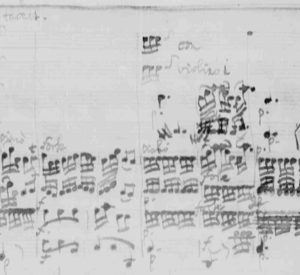Bringing Back the Fantastic Herr Fasch
Blogpost from our first all-Fasch concert (January 2007)
Pity other composers born in Bach’s century. After his death, Bach dominated perceptions of baroque music to such an extent that everyone else stood in six degrees of separation from him. Telemann’s chief claim to fame for centuries was being the guy who turned down a great job that eventually went to Bach.
Our virtually-forgotten Johann Friedrich Fasch could claim the same backhanded fame. He turned that job down, too (Bach was at best fourth choice for Kantor at the Thomasschule in Leipzig). Fasch was well known in his time. His music was in hot demand by the best orchestras in Europe: Dresden, Vienna, Prague. He was esteemed and highly productive. He was a major player in the baroque music world.
So how did he get to be the best baroque composer you never heard of? It’s partly Bach’s long shadow over his contemporaries, hindering other revivals. Vivaldi and Telemann came back in the twentieth century, but by the time Fasch’s turn came around, his music was gone. Not published in his lifetime, it exists only in manuscript. Unique, fragile, scattered and neglected, Fasch’s manuscripts deteriorated and disappeared over the years.
The Allied bombing of Dresden in 1945 practically destroyed a major cache. “They tried to save treasures in underground vaults,” says Richard Stone, Tempesta di Mare Co-Director, who is preparing Fasch editions for European publisher Prima la Musica. “But Dresden’s a river city. The vaults flooded.”

He holds up a photographed page of a manuscript. The notes stand out against nothing, because the staff lines are completely washed away. “It’s a good thing Fasch used quality ink for the notes. The trick is figuring out where the lines are supposed to hit them.” And that’s one of the better sheets, saved through heroic conservation work by the present-day Saxon State and University Library.
“Only a tiny fraction of Fasch’s music still exists,” says Barbara Reul, a Fasch scholar and Assistant Professor of Musicology, Luther College, University of Regina, Canada. Some instrumental works remain, but only a tenth of one thousand cantatas. All of the operas are gone.
What’s left is enough to make any music lover salivate, though. “Fasch is in the same world as Handel and Telemann, but he uses the musical materials in his own way. His music is so new and fresh,” says Reul, “like a great new recipe—same ingredients, but an entirely different flavor.”
Stone compares Fasch to Handel, too. “If you like Handel’s Water Music, you’ll love this,” says Stone about Fasch’s Ouverture Grosso in D.” Like Water Music, it has great melodies, vivid instrumental color and timbre, and lots of flashy passages for flutes, horns and reeds.
Although Fasch is sometimes described as a forerunner to composers of the classical era, Stone feels you can’t pigeonhole an original. “You really get the feeling that he was inventing his own musical language. It’s baroque,” Stone says, “but there’s something different, something distinctively Fasch. Fasch really goes in his own direction.”
Fasch appreciation is growing. When the well-known English orchestra leader Trevor Pinnock released a Fasch recording in 1995, it was practically an unprecedented event. But now recordings are burgeoning, to which Tempesta di Mare’s Chandos CD of modern world premieres will be an important addition. There is an International Fasch Society (www.fasch.net). Scholars such as Barbara Reul, Brian Clark and others are combing the archives of Europe to find more Fasch. New editions are emerging.
“There’s more out there,” says Barbara Reul, happily. “I’ll be doing Fasch to the day I die and loving every minute of it.”
Anne Hunter, Contributing Editor, is a writer and art historian living in Philadelphia.
